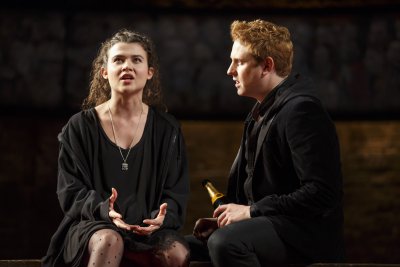King Charles III
This “future history” is a calculated commentary on two of Britain’s most deeply rooted traditions: the theater and the throne.
[avatar user=”Daniel J. Lee” size=”96″ align=”left” ] Daniel J. Lee, Critic[/avatar] Though today we most often think of the likes of Hamlet and A Midsummer Night’s Dream as Shakespeare’s greatest works, many scholars point out that, in their time, his history plays were the most popular. Indeed, the mystery surrounding the God-given power of kings has captivated audiences for centuries. Thus, King Charles III—a “future history” by British playwright Mike Bartlett currently playing at the Music Box Theatre—is a calculated commentary on two of Britain’s most deeply rooted traditions: the theater and the throne. Simultaneously homage to the Shakespearean practice of dramatizing British history and a critique of the vestigial authority held by royalty, Bartlett’s play examines these ideologies so ingrained in Western culture.
Opening immediately after the death of Queen Elizabeth II, King Charles III follows the blundering ascendency of its title character. Succeeding Great Britain’s longest reigning monarch proves to be a challenge for Charles, who is determined to establish his own legacy by asserting whatever political power the position of king still bears. Despite having faced years of media scrutiny over his affair with Camilla Parker Bowles and his mistreatment of his late wife Princess Diana, he curiously decides to shoot down a recently passed bill limiting the freedom of the press by refusing to sign it into law, a royal right thought to be only ceremonial. While his father shakes up parliament and the newspapers, Prince William and his wife Kate join forces to preserve the crown’s image. Meanwhile, the drinking and partying Prince Harry has a rendezvous with a commoner and begins to question whether he belongs in Buckingham Palace. The various story threads converge and culmination in an indictment of the twenty-first century royal family we know well.

Oliver Chris as Prince William and Lydia Wilson as Princess Kate in a scene from “King Charles III” (Photo credit: Joan Marcus)
Admittedly, many of the ideas in the play are hardly new or revolutionary: the first measures to limit the scope of the British monarchy’s power date back to the 1215 Magna Carta and subsequent arguments challenging the divine right of kings include the American Declaration of Independence, drafted in 1776. Rather, this production’s merit lies in the shocking immediacy it brings to the subject. Acutely aware of the fact that the nearly 90 year-old Queen will not live forever, Bartlett takes us into a not-too-distant future where the inevitable change of the empire’s figurehead sends the nation into a state of upheaval. His England is just melodramatic enough that to allow us to see it as fictional yet a shade too realistic to feel truly dystopian.
Under the direction of Rupert Goold, the world of the play is a set of contradictions. Made of faded brick and chipped mortar and adorned with ancient portraits of nobles, Tom Scutt’s faux Tower of London scenery is a stark contrast to the cast’s modern costumes (also designed by Scutt). The characters discuss contemporary issues like social media and Internet surveillance, but they do so uncomfortably in iambic pentameter dialogue and Shakespearean soliloquies. Consequently, the production seems to suggest that royalty and modernity are, perhaps, incompatible.

Tafline Steen as Jess and Richard Goulding as Prince Harry in a scene from “King Charles III” (Photo credit: Joan Marcus)
Despite the play’s often scathing critique of the royal family, Tim Pigott-Smith manages to create a surprisingly sympathetic King Charles. We see him as a simple man with the purest intentions, an inept leader determined to avoid—for once in his life—being seen as insignificant. Instead, Oliver Chris’ unfailingly dutiful Prince William and Lydia Wilson’s dangerously brilliant Kate are the embodiment of the crown and all that it stands for, good and (mostly) bad. Meanwhile, Richard Goulding’s Harry and Tafline Steen’s Jess, a commoner who forges a relationship with the melancholy prince, share a delightful chemistry that cuts through the political dramatics.
With one foot firmly planted in the past and the other prophetically stepping into the future, King Charles III unites centuries of British drama and history. Bartlett manages to simultaneously slam monarchy as an institution while highlighting its undeniably enduring influence. Perhaps, much like that of an effective play, the potency of today’s crown lies in its impotence. It doesn’t actually do anything; it doesn’t make laws or fight battles or accomplish goals by force. Instead, it exists as an idea, providing an unchanging narrative for its subjects to follow.
King Charles III (through January 31, 2016)
Almeida Theatre
Music Box Theatre, 239 W. 45th Street, in Manhattan
For tickets, call 212- 239-6200 or visit http://www.kingcharlesiiibroadway.com
Running time: two hours and 30 minutes including one intermission







Leave a comment